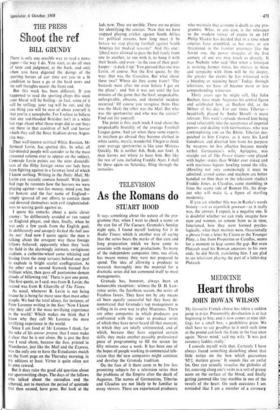As the Romans do
TELEVISION STUART HOOD
It says something about the nature of the pro- gramme that, when I went to check a name on the cast list of The Caesars, Granada's Sunday night epic, I found myself looking for it in Radio Times; which is another way of saying that the series bears the marks of that care and long preparation which we have come to associate with major BBC productions. To many of the independent companies time, too often, has meant money they were not prepared to spend. The idea of allowing a producer to research thoroughly into the material for a dramatic series did not commend itself to most managements.
Granada has, however, always been an honourable exception : witness the D. H. Law- rence series, the Jacobean season, the series of Feydeau farces. They have not by any means all been equally successful but they • have de- monstrated that Granada's top management is willing in its own way to play Maecenas. There are other companies in which producers are confronted with the order to produce series of which they have never heard till that moment, in Which they are totally uninterested, and of which, because they have acquired certain skills, they make another passably professional piece of programming to fill the screen for fifty minutes once a week. It has been one of the hopes of people working in commercial tele- vision that thisnew companies might continue and develop the Granada tradition.
On the face of it there seem to be few less promising subjects for a television series than the problems of the Empire after the death of Augustus. The names of Germanicus, Tiberius and Claudius are not likely to be familiar to many viewers. There are experienced producers
who maintain that costume is death to any pro- gramme. What, in any case, is the relevance to the modern viewer of events in AD 14? Philip Mackie has decided that in a time when empires have crumbled, as has ours, or are threatened in the frontier provinces like the Soviet one, the power struggles of the first century of our era may touch us directly. It was Niebuhr who said 'that when a historian is reviving former times, his interest in them and sympathy with them will be the deeper, the greater the events he has witnessed with a bleeding or rejoicing heart.' Today, through television, we have all become more or less comprehending witnesses.
Thirty years ago he might still, like John Buchan. have made Augustus his central figure and celebrated him, as Buchan did, as the Milner of his day. For our times Tiberius— beautifully played by Andre Morell—is more relevant. This week's episode showed him being eased reluctantly into the acceptance of imperial powers and dealing with Germanicus, who was contemplating EMI on the Rhine. Tiberius des- patched to him Crispus, as it were his Lord Goodman, and diverted him from his purpose by weapons no less effective because merely verbal. Germanicus's wife, Agrippina, was straight out of The Power Game—one played with higher stakes than Wilder ever risked and with mutinous legions howling round the villa. (Howling not very convincingly it must be
admitted; crowd scenes and mayhem are better handled on film than in the television studio.)
Freddie Jones. as Claudius, came stumbling.in from the seamy side of Roman life, the drop- out who will make it, a figure of startling modernity.
If you ask whether this was in Ranke's words history—wie es eigentlich gewesen—as it really
was, the answer, I expect, is a negative one. It is doubtful whether we can truly imagine how men and women, so remote from us in time, functioned, how they were formed psycho- logically, what their motives were. Occasionally a phrase from a letter by Cicero or the Younger Pliny, a line from Propertius or Catullus, seems for a moment to leap across the gap. But even Plutarch used his Roman ancestors to his own ends. So did North, translating him. I am glad to see television playing the part of a latter-day Plutarch.






































 Previous page
Previous page